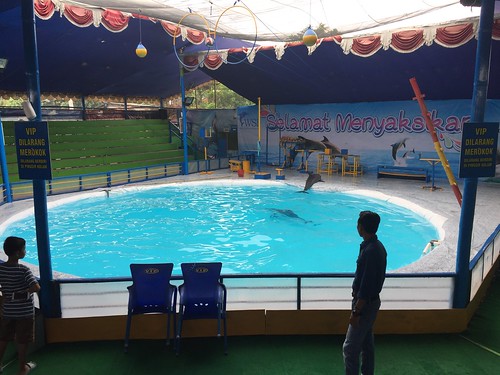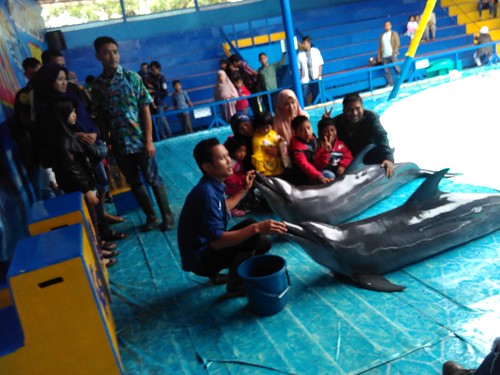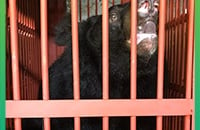Eight ways cruel circus life is killing dolphins in Indonesia
31 March 2017
For dolphins poached from the wild for Indonesia’s travelling circuses, life is stressful, barren and short – this is how they die for our entertainment.
Isolation
Dolphins are social animals which live in complex societies based on kinship. They mate for life, rear their young for years and live in dynamic communities. In captivity, all of that is taken away.
Here they suffer alone, unable to communicate, play and be close to friends and loved ones. Such extreme isolation results in increased aggression and other behavioural abnormalities.
Life in a bath tub
The temporary pools used by travelling circuses are small by human swimming pool standards. For dolphins they are utterly tiny and totally unsuitable.
In the wild, dolphins can travel 150km a day at speeds of around 50km per hour. In circuses, the pools can be swum across in a matter of seconds and are barely five metres wide. Such extreme confinement leads to both psychological problems and physical malaise.
Dolphins on a plane
It is hard to believe, but when the show ends, Indonesia’s travelling circus dolphins are scooped out of the water and put into crates. These coffins are then loaded onto trucks which will traverse bumpy roads over the course of up to 24 hours on the way to the next venue.
In some cases, these trucks will take the confined dolphins to planes which will fly them to another island and another performance.
The stress of prolonged confinement, lack of movement, danger of dehydration and ultimately fear at this totally unnatural situation will take a heavy toll on the dolphins’ health.
The sting of chemical water
We all know how unpleasant overly-chlorinated water can feel on our skin and eyes – well dolphins feel this too. They are just as sensitive to this chemical as us, but these poor animals do not have the option of getting out of the water. They will have to endure the pain of chemicals burning their eyes for the entirety of the time spent in the performance pool.
Deafened by the laughter, cheers, music and their trainer
After each humiliating trick, a performing dolphin is subjected to an aural assault. Cheering, clapping, laughing, shouting – none of it is natural for dolphins and each time it is deafening. Loud noise is known to acutely stress wild animals – particularly in non-natural environments.
Imagine how this great thwack by their trainer affects them.
When the show stops, the food does too
Performing dolphins are deliberately kept hungry. The circus needs them to be desperate for food – why else would they perform unnatural tricks? Each bizarre and pointless part of the performance is ‘rewarded’ with the food the dolphins need to survive and stave off hunger pains.
Yet, in contrast to their lives in the wild, hunting for fresh fish, captive dolphins in circuses are thrown old, dead fish. Yet even this is gratefully received. It’s all they are getting.
“Fish” out of water
Recent investigations into Indonesia’s dolphin circuses have revealed that while barbaric fire rings may be a thing of the past, the dolphins still spend large parts of the show out of water.
Dolphins are mammals and breath air like us, but they are not evolved to spend time out of water. Doing so is unnatural, stressful and has serious repercussions for health. Dolphins’ bodies are designed for a weightless environment, once out the water, the pressure on their internal organs can lead to long-term damage, while their sensitive skin is at risk of drying out.
This show kills the performers
The result of all this cruelty is deadly serious. In the wild, dolphins can expect to live up to 50 years, while those in the circus often don’t make it past five years old.
The stress of performance and travel, the captivity, the lack of social relationships and natural behaviours, the unsuitable pool water and the noise of crowds will ultimately kill this highly complex mammal.
If you are outraged by Indonesia’s dolphin circuses, help us stop them. Animals Asia is targeting local airline Sriwijawa Air, which is known to transport the dolphins between shows. If we can bring enough commercial pressure on them to end their complicity in the cruelty, we can severely affect the circuses’ financial viability. Add your name to the chorus calling for change.
BACK







 Freedom after two decades: Moon bears Nang and Mua rescued
Freedom after two decades: Moon bears Nang and Mua rescued
 With heavy hearts we say goodbye to our beloved Tulip
With heavy hearts we say goodbye to our beloved Tulip
 Three moon bears rescued from notorious bear bile farming hotspots in Vietnam
Three moon bears rescued from notorious bear bile farming hotspots in Vietnam